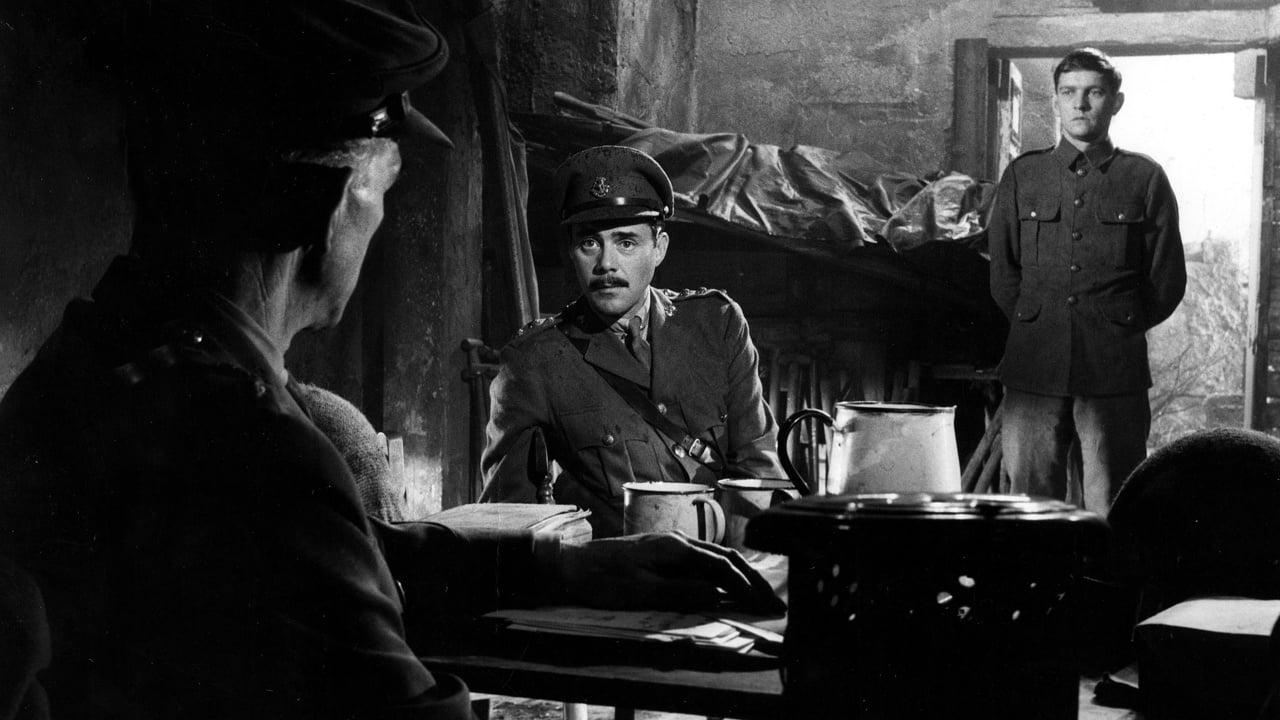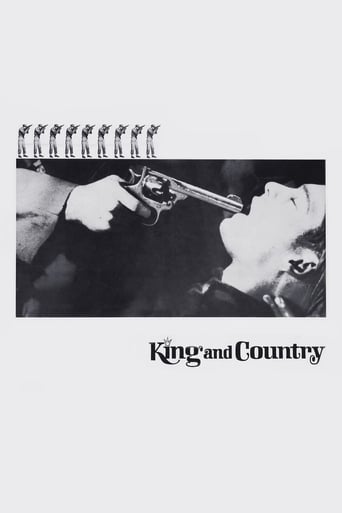Whitech
It is not only a funny movie, but it allows a great amount of joy for anyone who watches it.
Taraparain
Tells a fascinating and unsettling true story, and does so well, without pretending to have all the answers.
Roy Hart
If you're interested in the topic at hand, you should just watch it and judge yourself because the reviews have gone very biased by people that didn't even watch it and just hate (or love) the creator. I liked it, it was well written, narrated, and directed and it was about a topic that interests me.
Paynbob
It’s fine. It's literally the definition of a fine movie. You’ve seen it before, you know every beat and outcome before the characters even do. Only question is how much escapism you’re looking for.
sijoe22
.....My cable company gave this three and one half (out of four) stars, and I don't know why.Sort of a poor man's Paths of Glory or Caine Mutiny with none, and I mean NONE of the charm or depth.Movie didn't change much, from the first few minutes to almost the end.Didn't learn a great deal about WWI, either.Yeah, yeah, we get it, soldier leaves post due to either shell shock or cowardice and is put on trial, facing a possible death sentence. Boy, how many movies have had THIS plot before? Yawn.I thought the only thing that could rescue this crappy film was a surprise or happy ending, but I got neither.
st-shot
Like the incessant rain King and Country mired in mud and military litigation is a non stop emotionally powerful film of human spirit crushed by mechanized war and the necessity to maintain order. It's a chaotic Paths of Glory closer to the front and just as unjust.After repeated shellings and engagements with the enemy Pvt. Hamp (Tom Courtnay) is arrested trying to walk back to England from the battlefields of Europe. Put on trial for desertion he and his lawyer Captain Hargreaves (Dirk Borgarde) devise a plan to attempt to save him from the firing squad. With shelling in the distance court convenes.A filmed play with much shot in close-up along with a smooth and unobtrusive camera movement within the claustrophobic confines of the trenches ( with some telling stills) King and Country is an unrelenting depiction of absurd sacrifice stopping only for a moment to exterminate one with those around him scheduled for the same per order to immediately move out.Director Losey's anti war tract is one of the most sober and ultimately powerful of an era when anti-war films flourished with wild absurdities from King of Hearts to How I Won the War. His inquisitors drab bureaucrats instead of ogres his stage a rat infested quagmire instead of a chess board floor of a French Château the film resonates with a callous, hopeless and to add insult to injury clumsy rush to justice. Bogarde's Hargreaves is measured and restrained, his pauses and glances masking incertitude brilliantly. Coutrtnay is outstanding as the born to lose Hamp. Both touching and frustrating he states his case with a warped benign logic. Leo Mc Kern's hostile doctor also register's in a gruff way.King and Country may not match the scale of All Quiet on the Western Front or Paths of Glory but Losey's deft and tight handling within it's limited confine packs every bit as an emotional punch.
wes-connors
On a World War I battleground, British soldier Tom Courtenay (as Arthur Hamp) is arrested for desertion, after serving three years in combat. If convicted, the shell-shocked young man will be shot dead. He is assigned a military defense attorney Dirk Bogarde (as Hargreaves) who seems convinced Mr. Courtenay is guilty. However, as the trenches trial proceeds, Mr. Bogarde becomes more sympathetic regarding his client's extenuating circumstances. "King and Country" will either spare Courtenay, or kill him...Producer/director Joseph Losey does a convincing job with this drama, though it moves somewhat slowly until the end. Courtenay comes across as a shell-shocked man who volunteered for the war, and could no longer do battle after seeing his entire unit wasted away. He's commendable and understandable, and this shows in Bogarde's astute performance. The film's point is easily made, with Bogarde's character effectively leading doubters toward a shattering conclusion. The film, and both men, won award recognition.******* King & Country (9/5/64) Joseph Losey ~ Dirk Bogarde, Tom Courtenay, Leo McKern, Barry Foster
Robert J. Maxwell
In the early 1960s the world of international cinema was in a state of revolution, what with the French nouvelle vague and the emergence of an alternative culture in Carnaby Street. In its historical context, this film, directed by Joseph Losey and starring Tom Courtenay as the skinny deserter and the aristocratic Dirk Bogarde as his defending officer, is a bit retrograde.True, no movie about the First World War has ever seemed quite so thoroughly drowned in mud -- the rain is constant, the bunker walls run with water like cataracts, every surface drips -- and there are multiple shots of dead bodies, including a scene involving a horse carcass filled with joyous rats.But otherwise the story is both dismal and predictable. NONE of these guys on trial for their lives over a stupid and impulsive act ever gets off -- not Private Slovik, not the four French grunts in Kubrick's "Paths of Glory," not even Herman Melville's "Billy Budd." How can you expose the futility of war without someone's dying a pointless death at the hands of a feckless justice system? Not that Hodson and Jones, the writers, have caved. The officers of the court are reasonable and just or, at worst, no more stupid than the men they govern. They're just following the rules. It's the law that's really on trial.The action is all studio-bound -- the mud puddles, garbage dumps, trenches, jails, and bunkers. There are occasional inserts of still photos to give us some idea of the larger context.The performances certainly can't be faulted. Courtenay and Bogarde are both outstanding, and the supporting parts by actors like Barry Foster (who went on to become the "sex murderer" in Hitchcock's "Frenzy") are all up to par.Losey's direction is also hard to fault. The guy has a painter's eye for composition, and there is a scene in which Bogarde stumbles into his CO's underground office and the two converse about the trial and the death verdict. The CO is in the brightly lighted foreground. Bogarde sits in relative darkness beside him, farther from the camera. And nobody looks at anyone else. When Bogarde makes an outrageous remark, the CO barely turns his head before responding with something like, "A bit short on ceremony, aren't we?" There's a good deal of easy symbolism too. The other prisoners in the jail manage to catch some of the many rats feeding off corpses. They capture and torment them. And Bogarde, on his way to have it out with the CO, the death sentence in hand, slips to his hands and knees, and for the rest of the scene the piece of paper is dripping with mud and Bogarde's hands are covered with filth.The point of it all is, I suppose, that if a man spends years doing whatever he is told on the front line, sees all the other members of his platoon blown to bits, receives a letter informing him that his wife is betraying him, and walks dizzily away towards home -- we shouldn't kill him for it.World War I was one of the world's more mismanaged wars. There was an impassable line drawn between the ordinary soldier and the officer class, on both sides. If you lost ten men and the enemy lost eleven, the victory was yours. Americans seem to have a more difficult time grasping the significance of World War I, and it's understandable. The Allies fought the bloodiest battles during the first three years while American industry profited by selling goods to both sides. Unlike all the countries of Europe, our was never bombed or shelled. Worse was to come in another twenty years, of course, but thank God our understanding of stress responses had become more sophisticated.

